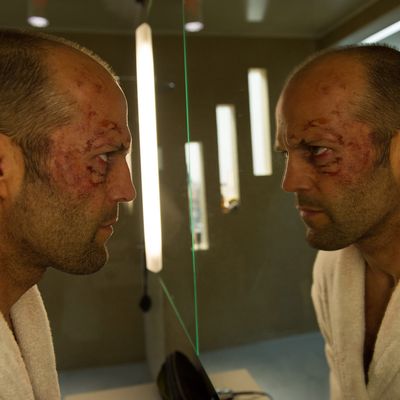
In Redemption, Jason Statham plays a homeless, alcoholic former British Special Forces soldier who’s fleeing a court-martial for a violent incident back in Afghanistan. The film opens with vague glimpses of that earlier event, much of it seen through surveillance drones. Then it cuts to London today — still seen via surveillance footage. Everybody’s watching everybody, it seems. You know your world is in trouble when a Jason Statham movie starts to feel prescient.
Actually, Redemption (released abroad with the decidedly un-Stathamian title of Hummingbird) is only partly a Statham movie. Yes, our hero, Joey Smith, will eventually rise from the gutter and start breaking bones, and yes, triads and perverts and workaday goons will all eventually feel his neck-snapping wrath. But the film is less a kick-ass action spectacle and more a moral fable — albeit a twisted one. Early on, Smith breaks into a posh apartment, only to discover that the owner is in New York for the summer. So he treats himself to the man’s pad, clothes, and bank account. It’s a ludicrous setup, and the movie knows it: When asked where he got the nice clothes, Joey jokes that they came from God.
Grace, however, is still a long way off. As he gets back into shape, Joey begins working as the muscle for a Triad boss, which leads him to do some terrifically disreputable things — taking money from struggling families and prostitutes, and, in one beyond-chilling scene, even overseeing the arrival of a shipment of human slaves. In the meantime, however, he’s also looking for the killer of a homeless girl, and he strikes up a relationship with a nun, Sister Cristina (Agata Buzek), who runs a soup kitchen. At one point, he asks Cristina to take a photo of him, so he can send it to his estranged daughter. “Will I look like a good man?” he asks her, with just the right hint of desperation in his eyes. It’s an understandable question: This is a guy who came out of the sewer, only to fall further into the muck.
By standard genre benchmarks, Redemption isn’t a film that will ever set the world on fire. A revenge story line, which would be the focus in most action/thrillers (especially ones starring Jason Statham), is relegated here to a subplot, as just an excuse to get Joey from point A to point B. But there’s a narrative sobriety and moral squalor here that suggests the film has a lot more on its mind. Director Steven Knight also wrote Stephen Frears’s Dirty Pretty Things and David Cronenberg’s Eastern Promises, other dark fables about the forgotten underbelly of urban Europe, and he has a real feel for characters that come from the invisible nocturnal masses. Indeed, it turns out that all that surveillance footage from earlier was, to some extent, ironic. Some things, and some people, can’t easily be seen by governments, the law, social safety nets, maybe even God. In that light, Joey’s deep dive into the worst parts of the criminal underworld starts to feel like a necessary, albeit unconscionable, evil.
Statham is at his best in over-the-top, tongue-in-cheek fantasies like the Crank and Transporter films, and usually he wouldn’t be right for this sort of brooding, more measured approach. There’s often a temperature mismatch, as with this year’s earlier Parker, where you got the sense that the star wanted to go one way while the glacially paced movie wanted to go another. Occasionally, though, it works: Roger Donaldson’s tense caper film The Bank Job mined previously unknown depths out of the actor. In Redemption, too, Statham brings real conviction to the part of a broken man who winds up breaking himself even more. Look beyond the generic shell, and this wildly imperfect movie appears to have a rare soul lurking inside it.


